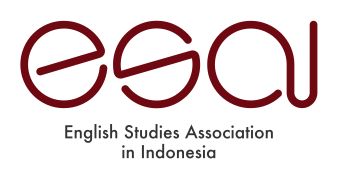Interlingual Errors in the Argumentative Essays: A Case Study of LS Private English Course
Abstract
Learning English becomes more and more important nowadays since we know that English is considered a lingua franca among countries which do not share the same language. Learning a different language is problematic since the target Ianguage may have different elements compared to the native language. These differences are often the trigger of making errors when using the target language. The writer carried out research on ten students of LSETC, Private English Course who have completed TOEFL program to have knowledge of the students' grammatical competence by means of two composition tasks comprising between 250 words and 350 words each, within forty-five minutes. Following Selinker's theory, the writer does the analysis first from the poinf of view of lndonesian structure, and then from the point of view of English structure. He used composition tasks, particularly argumentative essays to find out what kinds of errors come from first language transfer of grammatical knowledge (interlingual errors). In brief, the study aims to find out the errors taking place and give brief explanation in relation to Indonesian grammar. The results of the study are expected to be beneficial and can give a picture of inappropriate grammaticality in accordance with Indonesian structure, and therefore the students can be more aware of the difference between both languages.
Keywords: grammatical competence, interlingual errors, linguistic category taxonomy
References
Chomksy, N. (1957). A Theory of Competence, in Allen, J. P. B and Corder, S. Pit. (Ed.). The Edinburgh Cowse in Applied Linguistics Volume I: Reading for Applied Linguistics. 212-224. University Press.
Corder, S. P. (1974). Error Analysis. In J, P. B. Allen and S. Pit Corder (eds ) Techniques in Applied Linguistics (The Edinburgh Course in Applied Linguistics:3), London: Oxford University Press (Language and Language
Leaming), pp. 122-154.
Corder, S. P. (1981). Error Analysis and Interlanguage. Oxford: Oxford University Press.
Dulay, H., Burt, M., & Krashen, S. (1982). Language Two. New York: Oxford University Press.
Frank, M. (1972). Modern English. New Jersey: Prentice Hall Inc.
Gewehr, W (Ed). (1998). Aspects of Modern Language Teaching in Europe. New York: Routledge.
Horning, A. S. (1987). Teaching Writing as a Second Language. Carbondale and Edwardsville: Southern Illinois University Press.
Lee, W. R. (1972). Does the 'What' detennine the 'How'?. English Language Teaching Journal. 26/2 (February): I57-167.
Richards, J. C. (1974). A Non-Contrastive Approach to Error Analysis. In J. C. Richards (Ed.). Error analysis: Perspectives on Second Language Acquisition. 172-188. Essex: Longman.
Richards, J. C., & Sampson, G. P. (1974). The study of learner English. In J.C. Richards (Ed.) Error Analysis: Perspectives on second language acquisition. pp. 3-18.
Quirk, R., Greenbaumn, S., Leech, G., & Svartyik, J. (1985). A Comprehensive Grammar of the English Language. New York: Longman.
DOI: http://dx.doi.org/10.30813/jelc.v2i1.1016
Refbacks
- There are currently no refbacks.



2.jpg)



